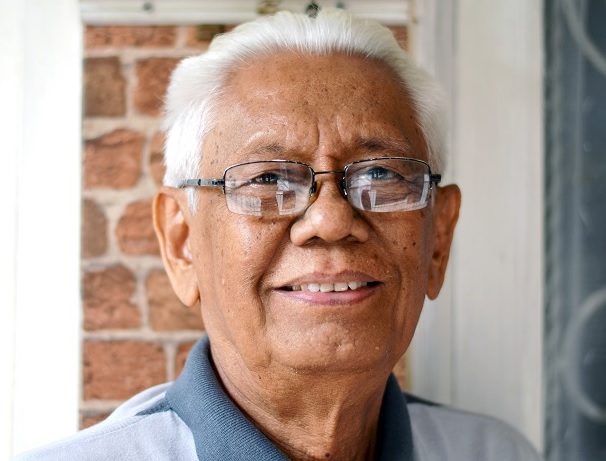Poems by Putu Oka Sukanta were translated by Vannessa Hearman and Kiernan Box with commentary written by Vannessa Hearman based on her interview with the poet.
Putu Oka Sukanta, poet and writer, was imprisoned by the Indonesian New Order regime between 1966 to 1976 as part of the army’s seizure of power and the purges of the Left. He learnt acupuncture from fellow inmates in prison. When he was released, he could no longer publish his work. As a former political prisoner during the New Order, he was restricted in what he could do. Acupuncture became a skill he relied on to make a living.
These poems were written during the Covid-19 pandemic when in the absence of vaccines and growing number of people becoming infected and dying in Indonesia, one of the easiest ways to protect oneself was to stay home and avoid contact with others. The themes of fear, dread, isolation, and desperate longing are reflected in the poems below. The poems were all written in his home in Rawamangun, Jakarta.
During the COVID-19 pandemic, Sukanta laid low to avoid becoming infected with the virus. He closed his home practice, and as a result, lost his source of income. Though he was not in prison this time, being in isolation, at times, reminded him of it.
|
Poster GELISAH Kutempel GELISAH Sudah setahun lebih Semoga jawabanku didengar R’mangun 30/05/21 |
The UNEASY poster I paste UNEASY Been over a year I hope they hear my answer (translator Kiernan Box) |
As his world shrank, the pleasures of life grew simpler. Together with the anxiety from the pandemic, old age is catching up with Sukanta, ‘My head is still on fire, but the body not so much’. In the mornings, a quick routine check assures him that he is still alive, reason enough to be happy.
|
BAHAGIA 1. aku sangat bahagia pagi ini, matahari masih berselimut mendung, aku masih berbaring betapa aku tidak bahagia, betapa bahagia aku, bukankah begitu sobat? sebab lidah lincah dijulur tarikkan sampai sepuluh kali, begitulah sederhananya |
HAPPY 1. I’m so happy this morning, the sun still shrouded by cloud, I’m still lying down how could I not be happy, how happy I am, isn’t that the way, friends? because pushing my tongue in and out, ten times that’s how simple it is. (translator Vannessa Hearman) |
Being an acupuncturist and herbalist and given his age of 82 years, he was very conscious of the need to protect one’s immune system, given the lack of vaccines at the start of the pandemic. In this poem, he reflects on the virus as a silent killer, and how to stay healthy in Indonesia, with its struggling health system, ‘What we eat and drink, also our thoughts, and activities that generate a sense of wellbeing, are all important.’
|
Ia. dalam perkerumunan, Ia kita tak mengenali wujudnya aku berlindung pada Dewa Surya, akhir juni 2020. |
It. in crowds, we don’t recognise its form I seek the protection of the Sun God, end of June 2020. (translator Vannessa Hearman) |

As the days and nights grew longer, and dreary, Sukanta writes about the tree that needs to shed its leaves to survive a European winter or a bad drought. ‘Being still (diam) is not the same as dying. Being still is also a form of resistance, a way to survive, to live again. Some people are stubborn, refuse to wear a mask and to believe that COVID exists, but whoever can hold on can survive.’
|
Refleksi akhir 2020 bagai sebatang pohon sendiri sebatang pohon meligirkan diri seolah rangka larut membeku aku bagai sebatang pohon Rwmangun, 30-12-2020 |
Reflection at the end of 2020 Like a tree all alone A tree sheds its leaves As if its whole skeleton has frozen I’m like a tree (translator Vannessa Hearman) |
Sukanta used to write whenever something appears in his mind. ‘Even at 2 in the morning, if I feel something, I write it down. So, it doesn’t disappear. This is something I started doing in prison. I write with the clouds, with the sun’s rays,’ he explains. But, in isolation, Sukanta’s mind grew restless, skittering from place to place, anticipating the day to come; yet he found that isolation sometimes blunted the imagination, so now he writes more with the flow.
|
Puisi menjelang malam Rintik rintik Rancangan mengisi esok pagi, Menjelang malam R.mangun, 30.04021 |
A poem as night approaches Pitter patter, drizzle Plans to occupy tomorrow, As night approaches (translator Kiernan Box) |

Even the night refuses to cooperate and to provide him with the inspiration he needs to write poems. ‘The night is no longer kind,’ he says, ‘the night too is restless.’
|
Malam. 3 sekarang malam menjadi jauh, sesekali saja melambaikan tangan, sekarang malam mengasingkan diri. rwmangun, 23/9/20 |
Night. 3 now night has grown distant, only occasionally waving, now night turns away. (translator Vannessa Hearman) |
Several poems deal with memories of friendship, recounting shared activities with friends, put on hold for a time.
|
Jalan kaki yuni ayuk jalan kaki, yuni, semalam diskusi apa? di kepala mereka saja yuni, ayunkan kaki R’mangun,30.01.21 |
Walking yuni let’s take a walk yuni, what did we talk about last night? only in their heads yuni, swing your legs now (translator Kiernan Box) |
Ultimately, he hopes that one day the doors will open, and friends can greet one another again. Sukanta explains what life has taught him, ‘Strength is built on friendship and solidarity, not isolation.’
|
Aku Berharap aku berharap aku berharap aku berharap Rmangun,17.05.20 |
I hope I hope I hope I hope (translator Vannessa Hearman) |
Vannessa Hearman (vannessa.hearman@curtin.edu.au) is senior lecturer in History at Curtin University and a nationally accredited translator (Indonesian into English). Kiernan Box (kiernanbox@gmail.com) is a Melbourne-based student of Indonesian language and literature. The translators gratefully acknowledge Keith Foulcher for his feedback.












